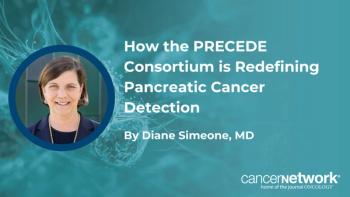
Genetic Testing Identifies and Helps to Prevent Pancreatic Cancer
There are certain markers that can point to a greater risk of pancreatic cancer like BRCA1/2, and diabetes, according to Brian M. Wolpin, MD.
There is a lot going on in the field of pancreatic cancer risk assessment, particularly around genetics and altered metabolism, according to Brian Wolpin, MD, MPH, director of the Gastrointestinal Cancer Center and co-director of the Pancreas and Biliary Tumor Center, and Robert T. and Judith B. Hale Chair in Pancreatic Cancer at Dana-Farber Cancer Institute, and professor of medicine at Harvard Medical School.
During a conversation with CancerNetwork® following his presentation at the 15th Annual Ruesch Center Symposium about pancreatic cancer risk assessment, Wolpin spoke about genetic testing in patients with pancreatic cancer. Specifically, every patient diagnosed with pancreatic cancer is recommended to get tested because if certain genes are found, like BRCA1/2,that means other members of their family can be at risk. He noted that one of the next hurdles to overcome is figuring out how to prevent patients who are at risk from ever contracting pancreatic cancer.
Regarding metabolism and altered metabolism, Wolpin points out that patients who are recently diagnosed with diabetes are at heightened risk of developing pancreatic cancer. Now, he said, it’s time to figure out how to use that information to identify and prevent pancreatic cancer.
Transcript:
There are a number of ways that the field is moving to try to understand the risk of pancreatic cancer. There’s still quite a bit of work to do on the genetic side of things [like] better defining what genetic features predispose [patients] to pancreatic cancer. Genetic testing is recommended for all patients who develop pancreatic cancer [to look] for genes like BRCA1, BRCA2, and others because if we find them, we know that [other] members of that family should be screened for pancreatic cancer. There's a lot of work going into these ideas. [The question is], how do we think about genetic risk, and then, how do we make sure that, [for] the patients who are at genetic risk, the cancer is found early, or maybe even prevented altogether. [That means] we [have to] do something that prevents the cancer from forming, as opposed to trying to find it early. That field is sometimes called “interception”, where we’re trying to intercept the tumor early. That’s a big area of research. I’d say [there is] certainly a lot going on the genetic risk side.
[There is also] a lot going on in the area of metabolism and altered metabolism centered around the observation that patients with diabetes can also develop pancreatic cancer in a relatively short interval after their diabetes diagnosis. There’s quite a bit of work going on, trying to understand how we [should] use that, clinically, to try to help find cancers early or try to prevent cancers [altogether]. There’s lots of work in that space.
Reference
Wolpin BM. Expanding the toolbox for pancreatic cancer risk assessment. Presented at the 15th Annual Ruesch Center Symposium; November 21-23; Washington, DC.
Newsletter
Stay up to date on recent advances in the multidisciplinary approach to cancer.





































